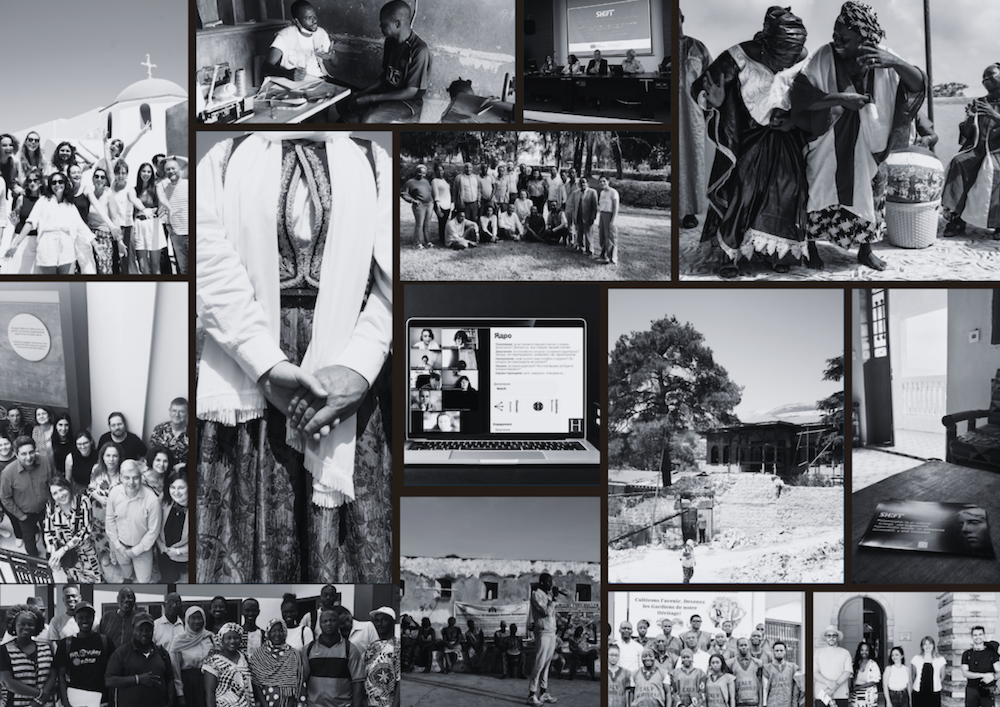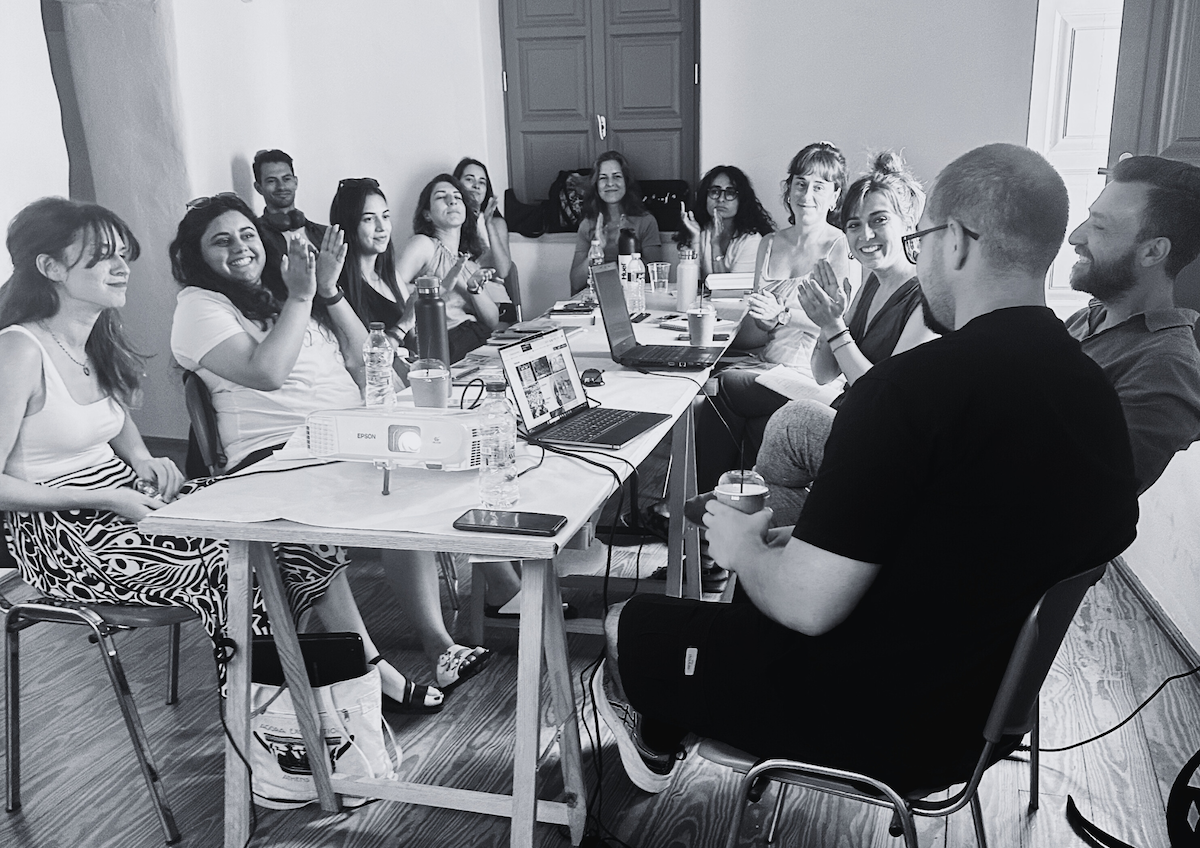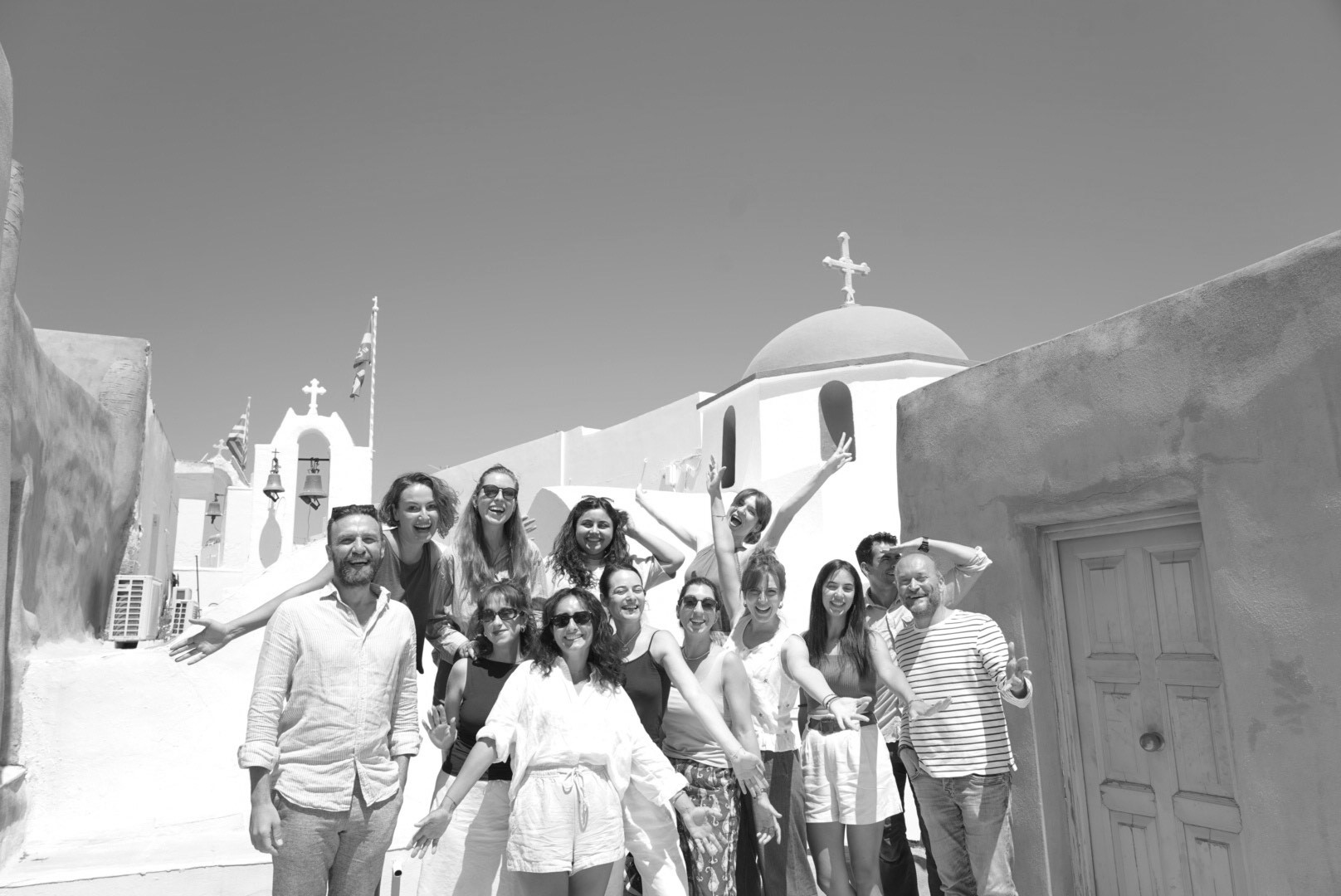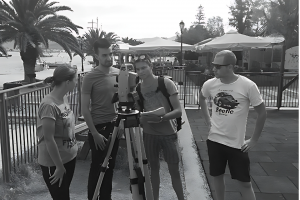Tag Archives: Summer school
Summer Field School in Community Engagement for Cultural Heritage
This summer, HERITΛGE’s 11th Engaging Communities in Cultural Heritage Summer School brought together students, researchers and practitioners from around the world for two weeks of learning, discovery and collaboration. Through a range of activities, participants explored how communities engage with cultural heritage through a mix of academic sessions, practical fieldwork and creative activities.
The first week of the programme involved online teaching where participants were introduced to the ideas of engaging communities. Then, from June 23rd to July 6th, participants travelled to the Island of Paros where they were able to further explore what they had learned. Here is a look back at how it went.
Day 1: Mapping First Impressions
The in-person programme began in Paroikia, the island’s capital. After an introductory session, participants stepped out to create personal maps of the area using their senses as guides. In a group discussion, they shared first impressions and identified key questions to explore in the days ahead.
In the evening, the group travelled to Aliki to join the Klidonas midsummer festival. Music, dancing and lively conversation provided a first opportunity to connect with the local community and one another.
Day 2: Sensing the Island
Participants deepened their exploration by tuning into the sensory dimensions of Paroikia, focusing on its sounds, smells, textures and colours. Later, they collaborated on a collective mental map that reflected both individual and shared perspectives.
The day ended with a welcome dinner by the coast, accompanied by traditional music and conversation.
Day 3: Observation and Oral History Skills
Having become more familiar with the environment, participants focused on specific locations of interest, blending observation with active participation.
A hands on session introduced tools and techniques for conducting oral history interviews, with a focus on audio and video recording.
Day 4: Learning from the Locals
The group met with Spyros Mitrogiannis, a leading figure in local cultural work, who guided a visit to the Institute for Archaeology of Paros and the Cyclades. He shared insights into the cultural, environmental and political landscape of the island.
In the afternoon, participants examined themes such as ancient quarrying, fishing traditions and contemporary religious practices, laying the groundwork for their field research.
Day 5: Stories from Afar and At Home
Two guest speakers enriched the day’s programme. In the morning, Traci Kawai presented the Fisher Child project from Cape Town, a VR and AR exploration of sea, memory and healing.
In the evening, Katerina Konstantinou shared her research on folklore and local material culture, examining how heirlooms and souvenirs shape participatory documentation.
Between sessions, teams continued developing interview guides in preparation for community engagement.
Day 7: Walking the Paths of Heritage
In northern Paros, participants met Malatestas, President of Paros Park, who spoke about the challenges of heritage management and local involvement. A walk through the park’s trails highlighted the close ties between landscape and culture.
The day concluded with a beautiful sunset watched from the beach.
Day 8: Festivals and Tourism
The day focused on festivals as expressions of identity. Vicky Papadimitriou shared her experience with local, regional and national events, while Tim Healing offered case studies on community tourism and sustainability, prompting thoughtful discussion on responsible development.
Participants also used the day to refine their ongoing projects.
Day 9: Stories Set in Stone
The morning opened with discussions about interviews already carried out, ranging from fishing traditions to quarrying and religious offerings.
In the evening, Spyros Mitrogiannis led a visit to the Ancient Marble Quarries at Marathi, offering historical context and highlighting present day challenges around preservation.
Day 10: Visual Identity and Storytelling
Participants continued reviewing interview materials and shaping their group projects. In the afternoon, Irene Biza led a session on design and identity, exploring how visuals influence perceptions of place.
The day concluded with a screening of Yorgos of Kedros, a documentary that sparked reflection on storytelling and self representation.
Days 11 and 12: Final Preparations and Reflections
As the public presentations approached, teams worked to analyse ethnographic data and create podcasts, videos and visual materials.
Participants also attended a lecture by visual artist Natassa Biza, who offered new insights into ancient spolia around Paroikia, challenging conventional perceptions of historical remnants.
The final day was dedicated to collaboration, as teams prepared their presentations to the local communities and reflected on their shared journey.
Online Conference and Presentation
The field school concluded with the Online Engaging Communities Conference on Sunday, July 6th, where participants shared their insights and creative outputs with an international audience. This event was exclusively available to our trainees and alumni and included presentations and insights from the Summer Field School Alumni who shared their current research projects, sparking an engaging session enriched with thoughtful discussions and commentary.
Following the conclusion of the Conference, the trainees organized a presentation of their work that was open to the public and was widely attended. The presentation took place in the Dimitrokopoulos Building in Paroikia, with the kind support of the Municipality of Paros. During this second part of the evening, participants had the opportunity to share insights from our two weeks of fieldwork with attendees interested in their work.
“After days filled with collective challenges and individual discoveries, often marked by the initial confusion that is so characteristic of ethnographic research, this final presentation felt like both a validation of our efforts and an affirmation of our growing professional identities,” reflects trainee Claudia Valisano. “Beyond that, the event also had the potential to spark fresh interest among local residents in the island they call home, renewing awareness both for them and for us. Once all speeches were delivered and questions from the audience were addressed, guests were invited to enjoy food and drinks on the building’s beautiful terrace.”
You can find out more about our Summer School programmes and future dates here.
New dates for HERITΛGE summer field schools 2025
HERITΛGE is pleased to announce new dates for our 2025 summer schools. The HERITΛGE summer schools are excellent opportunities for heritage professionals and students to develop existing knowledge and learn new skills for managing heritage. Applicants do not have to have previous experience in the particular field of study and we welcome students eager to improve their understanding in new areas of heritage. Places are limited so we recommend applying soon!
HERITΛGE is offering two programmes for 2025:
Engaging Communities in Cultural Heritage
Date: 16 June – 6 July 2025
Location: Paros, Greece (in person and online)
Language: English
Lecturers: Dr Aris Anagnostopoulos and Dr Lena Stefanou alongside guest lecturers, Dr
Evangelos Kyriakidis and Vicky Papadimitriou
This hybrid programme aims to develop a different approach to community engagement that is based on social and artistic research with community-led initiatives. Through meetings, assignments and fieldwork, students will be introduced to the principles of community engagement and learn how these can be applied in different circumstances, appropriately addressing cultural differences within the field. The duration of the course is two weeks, with five three-hour meetings. Fieldwork will take place on the island of Paros, in Greece.
I applied to this workshop to improve my fieldwork methodology, and I found it greatly helped
me develop because I was able to learn about those details that we cannot learn without
going into the field and starting to work. It has really helpful for me on how to conduct my
research questions and how to engage with the people I am interviewing. (Elif Aydin, a PhD
Candidate at Istanbul Technical University. Engaging Communities in Cultural Heritage,
2024)
Click here for more information and how to apply.
Digital Tools for Cultural Heritage Management
Date: 13 May-17 June 2024 (applications now open)
Location: Nafplio, Greece (in person and online)
Language: English
Lecturer: Dr Cornelis Stal
HERITΛGE have collaborated with HOGENT University (Belgium) to deliver three integrated and consecutive specialist courses in geomatic topic. These courses will cover GIS, Photogrammetry and image-based 3D modelling, and Terrestrial laser scanning*. Students will be provided with hands-on instruction, hands-on demos and exercises in each. Skills taught will help heritage professionals in restoration, documentation, or visualization projects specifically but can be applied to a range of other fields.
*Please note that these specialist courses can be booked individually. For those intending to just do sections of the field summer school, please contact at the email [email protected] for further information and arrangements.
I decided to take the course because I think it could be very useful in my work both for documenting for the future, using it for planning in daily work with managing heritage buildings. Also to make available on the internet for people who are not able to visit in person.(Helen Myhr Radell, Project Leader, Stiftelsen Skansen. Digital Tools for Cultural Heritage Management, 2024)
It was amazing, moving from place to place from old archaeological sites to old church photogrammetry and dealing with all this senior equipment like drones, laser scanning. Processing all this data gives you fuller information and the full picture about the process so you will then be able to it by yourself! (Khaled Hiatlih, Co-founder Heritage Roots. Digital Tools for Cultural Heritage Management, 2024)
Click here for more information and how to apply:
This course is supported by Metashape.
Community Engagement Encounters in Paros
Twenty two cultural heritage managers were able to explore the Greek island of Paros and dive deep into its communities during this years’ Engaging Communities in Cultural Heritage Summer Field School that ran from June 17 to June 30. Eleven of our trainees attended online and another eleven in person.
“The Summer School was amazing, very intense, both in terms of our schedule but also in terms of the relationships that we were building and the activities we undertook outside the classroom, from participant observation to to a very casual outing or an invitation to a local event,” said Dr. Lena Stefanou.
This summer’s trainees came from Africa, Asia, Europe and North America – Azerbaidjan, Bangladesh, France, Greece, Kenya, Lithuania, Malawi, Nigeria, Romania, South Africa, Sudan, Switzerland, Tanzania Turkey, Uganda, the United Kingdom, USA, and Zimbabwe.
The training sessions as well as the final event, during which the participants presented their work to the wider community in Paros, all took place in the Dimitrakopoulos Building in the town of Paroikia that was generously made available by the Municipality of Paros.
During this intensive 2-week field school, participants were introduced to the principles of community engagement and heritage values and presented with a dynamic mode of interdisciplinary research tailored to community needs.
“Community engagement is often messy and unpredictable work. Participants in our Community Engagement Summer school gain the skills and techniques to conduct their own research, to plan effective community engagement projects that are tailor-made for the communities they are working with” said Dr. Aris Anagnostopoulos, HERITΛGE Community Engagement Manager.
Trainees had the opportunity to do collaborative research and get involved in community engagement initiatives. They also received training in applied ethnography, conducted oral history interviews, learned to document personal narratives, and file and catalogue oral history archives. They also practiced curating multimedia content and creating narratives for online presentations and/or podcasts and explored the possibilities of cultural heritage becoming part of online repositories and temporary exhibitions.
Participants also attended lectures by invited speakers who specialize on diverse heritage fields and had the opportunity to hear from representatives of HERITΛGE partners Paros Festival and Ai Mnimai who presented real-life, local case studies on community engagement and cultural heritage.
“I applied to this workshop to improve my fieldwork methodology, and I found it greatly helped me develop because I was able to learn about those details that we cannot learn without going into the field and starting to work. It has really helpful for me on how to conduct my research questions and how to engage with the people I am interviewing,” said Elif Aydin, a PhD Candidate at Istanbul Technical University.
Summer school participants also had the opportunity to attend a presentation of SHIFT, a project funded by Horizon Europe to help make cultural heritage more accessible, inclusive and appealing using techological advances in artificial intelligence, machine learning, haptics, and other sectors.
2023- 2024: Our academic year in review
 On Saturday, June 30th, the HERITΛGE team wrapped up the 2023-2024 academic year with an event on the Greek island of Paros island to mark the end of our Community Engagement for Cultural Heritage Summer Field School. The event was the culmination of possibly the most successful academic year since the organization was founded 15 years ago.
On Saturday, June 30th, the HERITΛGE team wrapped up the 2023-2024 academic year with an event on the Greek island of Paros island to mark the end of our Community Engagement for Cultural Heritage Summer Field School. The event was the culmination of possibly the most successful academic year since the organization was founded 15 years ago.
During the last 12 months, HERITΛGE completed 40 training activities that included online and in-person workshops, two hybrid summer schools, and an academic Certificate program bearing ECTS credits, delivered in cooperation with HOGENT University in Belgium. Over 650 heritage managers and caretakers were trained in managing heritage assets, independent of project specifics.
We expanded our curriculum with a new conservation course, First Aid for Finds. The 3-day online workshop complements the Introduction to the General Principles of Cultural Heritage Conservation workshop we introduced in the academic year 2022-2023. In the past year, we also ran two successful pilot programs in Interpreting Heritage and Engaging Communities for Climate Change and in Community and Economic Development, focusing on community-based tourism. Both will form part of our 2024-2025 academic year training offerings.
We also expanded our partnership with the Mellon Foundation through our HerMaP Africa program, funded by the Foundation’s Humanities in Place initiative. Through HerMaP Africa we have already awarded 60 grants and 60 fellowships to heritage organizations and professionals across Africa. Through HerMaP Gambia, a program co-funded by the European Union, we continued to work to strengthen The Gambia’s heritage sector in order to contribute to the creation of more and better jobs for the country.
Thanks to the British Council, our project in Pakistan on the protection of Buddhist rock carvings in Swat (in partnership with the Italian Mission and EssaNoor Associates) has gotten off the ground. Our J.M. Kaplan Fund work in Iraq has been completed and so has our Creative Europe project in Ukraine, training heritage managers in digital storytelling for Ukrainian Museums – together with Ukrainian partners. Our cooperation with Aliph and local partners enabled us to contribute to the efforts to safeguard local heritage in the aftermath of last year’s catastrophic earthquakes in Turkey and Syria. This academic year we also helped create the Living Heritage Network which aims to bring together and empower all organizations and individuals working with Greek living heritage.
Meanwhile, we continued working with some of Europe’s best-known academic and research institutions as well as heritage organizations and private businesses to make cultural heritage more accessible and inclusive through SHIFT, a project funded by the European Union’s Horizon Europe program.
Finally, earlier in 2024 we started working on AHEAD, another Creative Europe program, this time aiming to strengthen European cultural heritage institutions’ audience development efforts.
These are most but by no means all the projects our team is working on, all the while expanding HERITΛGE’s impact and outreach efforts. Stay tuned for more!
Develop your heritage management expertise with HERITΛGE’s cutting-edge Summer Field Schools
Develop your heritage management expertise: gain new skills and embrace best practices with HERITΛGE’s cutting-edge Summer Field Schools
HERITΛGE is thrilled to announce we are now accepting applications for our upcoming Summer Field Schools, offering exceptional opportunities for cultural heritage professionals. These intensive programs delve into crucial aspects of heritage management, providing participants with hands-on experience and cutting-edge knowledge in two key areas: Digital Tools for Cultural Heritage and Engaging Communities for Cultural Heritage.
Digital Tools for Cultural Heritage Summer School: Unlock the Power of Digital Tools in Heritage Management
In the ever-evolving landscape of heritage management, digital tools play a pivotal role. HERITΛGE, in collaboration with HOGENT, presents a unique summer school program focusing on the acquisition, processing, management, and analysis of spatial data. This program introduces participants to three specialized courses:
- GIS (Geographic Information Systems)
- Photogrammetry and Image-based 3D Modeling
- Terrestrial Laser Scanning
Theoretical aspects will be delivered online, allowing for flexibility, while on-site tasks will provide practical, hands-on experience. For those able to travel to Greece, an exciting opportunity awaits to practice Photogrammetry and Laser Scanning in the field with in-person support from instructors. The program, organized in collaboration with the municipality of Nafplio, Greece, aims to document historically significant structures, serving as the educational arm of the HERITΛGE research project.
Engaging Communities for Cultural Heritage Summer School:Redefining Community Engagement in Heritage Management
Community engagement is at the forefront of heritage institutions worldwide. HERITΛGE’s hybrid program focuses on community-led initiatives, social and artistic research, and practical exercises. Collaborating with local festivals and initiatives on the Greek island of Paros, this program offers a dynamic approach to community engagement. Participants, whether online or in person, will explore ethnography, oral history, and multimedia content creation, contributing to research and the preservation of local heritage.
Why Choose Heritage Management Organization’s Summer Field Schools?
Tailored Learning: Programs cater to both beginners and professionals, providing a platform for skill development and research.
Expert Collaboration: Collaborate with experts from renowned partners.
Real-world Experience: Engage in practical exercises, fieldwork, and community-led initiatives to apply theoretical knowledge.
Global Impact: Contribute to larger research projects, shaping the future of heritage management worldwide.
How to Apply:
For those eager to embark on this transformative journey, applications are now open. Visit our website for more information and to secure your spot in these exciting summer field schools.
Whether you’re interested in digital tools or community engagement, HERITΛGE invites you to explore, learn, and contribute to the preservation of cultural heritage.
Join us this summer and be part of an international community dedicated to shaping the future of heritage management!




